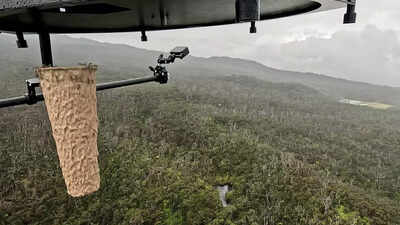Hawaii's unique bird species are under siege. To combat the threat, scientists are employing an innovative approach: deploying mosquitoes from drones to fight back against the devastating impact of invasive mosquitoes.

The Hawaiian Islands are home to a diverse array of native bird species, many of which are found nowhere else on Earth. However, these precious creatures face an existential threat from invasive species: mosquitoes. Vox Media reports that drones are now being used to release containers filled with live mosquitoes over Hawaii's remote forests. This strategy is a response to the islands' escalating extinction crisis.
Hawaii has already witnessed the loss of numerous unique species due to invaders like feral pigs and stray cats. With many native animals teetering on the brink, scientists are racing against time to conserve what remains.
Hawaii's forest birds, particularly the beloved honeycreepers, are highly susceptible to avian malaria, a disease transmitted by non-native mosquitoes. Climate change is worsening the situation, enabling mosquitoes to thrive at higher elevations, further endangering the remaining bird populations. From a population of over 50 species, only 17 honeycreeper species remain today. Many have already been driven to extinction.
Scientists are focusing on saving these birds because malaria is the primary driver of their decline. A novel approach to combating the disease is being explored: releasing mosquitoes via drones. This drone-based solution is a promising step in safeguarding Hawaii's irreplaceable wildlife.
Mosquitoes, not native to Hawaii, were introduced in the early 20th century. Since then, they have spread rapidly, becoming a major threat to local bird populations. They transmit diseases like avian malaria and avian poxvirus, which can be fatal to many native bird species.
The presence of mosquitoes has had a devastating impact on Hawaii's native bird populations. Several species, including the Palila and the Akikiki, are critically endangered. As these species are unique to Hawaii, their extinction would represent a significant loss, not only for the island's ecosystem but for the entire planet.
Conservationists are employing a multi-pronged approach to protect Hawaii's native bird populations. These strategies include habitat restoration, captive breeding programs, and mosquito control measures.
Newer articles
Older articles
 Wimbledon’s youthful buzz: Smelling of teen spirit ahead of the Championships
Wimbledon’s youthful buzz: Smelling of teen spirit ahead of the Championships
 Chess Sensation Praggnanandhaa Joins Magnus Carlsen's Team Liquid Ahead of Esports World Cup
Chess Sensation Praggnanandhaa Joins Magnus Carlsen's Team Liquid Ahead of Esports World Cup
 Bennett to take no further part in SA Test, Masvaure named concussion substitute
Bennett to take no further part in SA Test, Masvaure named concussion substitute
 Gavaskar Calls for Kuldeep Yadav Inclusion in Second Test Amid Bumrah Fitness Concerns
Gavaskar Calls for Kuldeep Yadav Inclusion in Second Test Amid Bumrah Fitness Concerns
 Stokes Lauds England's Opening Duo After Stunning Headingley Chase Against India
Stokes Lauds England's Opening Duo After Stunning Headingley Chase Against India
 Nitish Rana Set for Delhi Return After Disappointing Uttar Pradesh Stint
Nitish Rana Set for Delhi Return After Disappointing Uttar Pradesh Stint
 Nitish Rana Eyes Delhi Return After Disappointing Uttar Pradesh Stint
Nitish Rana Eyes Delhi Return After Disappointing Uttar Pradesh Stint
 India Squad Update: Harshit Rana Released Ahead of Second Test Against England in Birmingham
India Squad Update: Harshit Rana Released Ahead of Second Test Against England in Birmingham
 Rishabh Pant Redefining Cricket: Greg Chappell Hails Wicketkeeper-Batter as a "Match-Winner"
Rishabh Pant Redefining Cricket: Greg Chappell Hails Wicketkeeper-Batter as a "Match-Winner"
 Steve Smith Eyes Grenada Test Return After Finger Injury
Steve Smith Eyes Grenada Test Return After Finger Injury